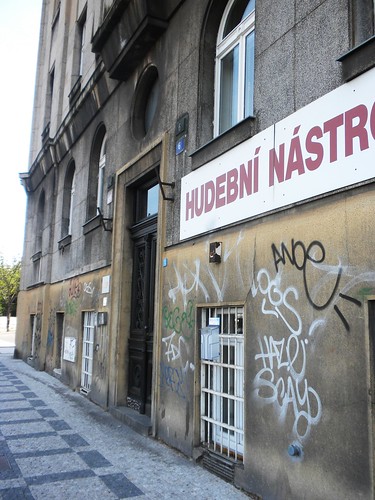My first week hasn’t even ended and I already have been through an emotional rollercoaster. But before I get ahead of myself, a brief recap:
After trying my best to remember how the Prague metro system works, (thank goodness it’s so much like DC’s!) I start my day by attempting to find Dženo’s office. Luckily, the directions were quite clear and I find it relatively easily, despite how nondescript the building itself is.
I walk into the office, only to be told that this summer it will just be the coordinator and myself in the office. So much for shoulder to shoulder training. According to Ivan Veselý (the coordinator of Dženo), there has been a steady stream of disappointment for the organization. He laments that although the organization has produced studies, complete with recommendations for the Czech government, nothing is being done. He blames the bureaucracy and the Bolsheviks which run the system. An interesting turn of events, but nothing I can’t handle. He then turns to discussing the fact that he sees Dženo being used as a scapegoat by the Czech government, an alibi to present when they are asked about involvement with Roma groups. In response to this I can do nothing but try to look empathetic.
To try to make things a little less heavy, I mention ideas about using Facebook and twitter as advocacy. However, he seems less than enthusiastic.
“They’re for fun. Not serious business.” He says. Okay, different tactic. (Note: I did create a Causes page about the quilt we will be working on this summer – check it out!)
I ask him how he feels about the website, and offer to work on a new one. “It could be updated,” he says with a sad smile, “but who would maintain it if I stop working here?” (Additional Note: If you would like to check out the very first version of a website about the quilting project, tell me what you think!)
It’s a good question considering Dženo and Ivan are one in the same. So I bring up the idea of the quilt, and he seems to perk up a bit. He already has contacted a woman named Emilie Horačkova who is an activist for Roma rights and an experienced craftswoman and we plan a meeting for next Monday.
He seems to be at a loss, however, about where to get in contact with the women we need to make this quilt a reality.
“Oh, Emilie knows lots of groups. She can talk to us next week.”
Next week?! Maybe it’s the neurotic east coaster in me, but that is way too late! I ask if I can look around too, and he says of course. Then he sets me up in the back office to do some research on women’s groups.
Luckily, with the help of The Advocacy Project and a quick internet search, I got in contact with a Roma women’s group called Manushe, which works out of the group Slovo 21. They immediately get back in touch with me, and we planned a meeting for the very next day. As we discussed this project, they seemed to get more and more excited, and we settled upon working with the women at their summer school for Roma women. The timing is perfect – it’s the same time that the director of The Advocacy Project, Dr. Iain Guest, is coming to Prague.
The only thing that is really weighing on my mind is the fact that I worried these women aren’t going to OWN this project. How can I be sure that this is the best strategy to get the issues heard? What else can I do to help Dženo, especially when the director seems almost defeated by trying to break through the government? Am I in over my head?
How can I make sure this project doesn’t become another victim of bureaucracy and Bolsheviks?
Posted By Beth Wofford
Posted Jun 17th, 2011


